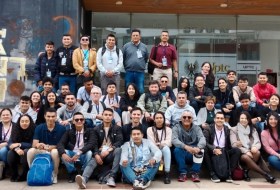News
Professors and students from Unicauca present their research papers at the XXIII Colombian Congress of Mathematics 2023.
The massive participation of members of our university community in the country's most important event in the field of Mathematics, held in the city of Tunja, is a reflection of the academic development of the University of Cauca.
The XXIII Colombian Congress of Mathematics taking place in the city of Tunja from June 5th to 9th, 2023, is an event organized by the Colombian Mathematical Society in partnership with various academic institutions. This time, the University of Cauca had the participation of 14 faculty members, 5 postgraduate students, and 6 undergraduate students linked to the Department of Mathematics at the University of Cauca.
The University of Cauca celebrates and congratulates the participation of the following professors and their respective research topics:
Maribel Díaz, along with Martha Romero, presented their paper titled “Using a Catalan identity for an integral representation of generalized polynomial sequences of Fibonacci.”
Wilmer Molina and Jhon Jairo Pérez: “Stability and Hopf bifurcation in a diffusive prey-predator model with Holling type II functional response, Alle effect on the prey.”
Wilson Martínez: “Applications of algebraic structures: construction of some non-associative algebras.”
David Daza: “Erdös-Rényi graph and b2 sets.”
Samin Cerón: “Growing with mathematics on the street.”
Carlos Martos: “The minimum overlap problem on finite groups.”
Carlos Trujillo: “Coast cubes and b3 sets.”
Diego Correa: “A smoothed quasi-Newton local algorithm to solve the nonlinear complementarity problem.”
Samin Cerón and Roxana Romero: “Tic and Tac applied to Linear Algebra.”
Eric Bravo: “On concatenations of Padovan and Perrin numbers.”
Aldo Parra: “Changes in students' epistemological beliefs, attributable to the Mathematics Degree program at the University of Cauca.”
Pilar Astudillo: “The King-Werner method on Lie groups.”
Freddy W Bustos: “Squares as the sum of two triangular numbers.”
Likewise, the participation of postgraduate students from the Doctorate in Mathematical Sciences with their respective research approaches: Jesús Fabián Muñoz and his presentation titled “Fibonacci numbers close to Pell numbers”; Wilmer Sánchez, “An inexact smoothed Newton method to solve the nonlinear complementarity problem.” Also, students from the Master's in Mathematical Sciences: Anyi Corredor, “Bolzano and the continuum: the importance of the method of proofs and refutations for the history and philosophy of mathematics”; Karen Sacanamboy, “Perrin squares that are Perrin numbers” and Julieth Ruiz, “Power of two classes in the generalized Fibonacci and Pell sequence.”
And finally, the well-deserved recognition for their participation in the congress goes to the undergraduate students in the Mathematics program:
José David Solarte and his presentation titled “A measurability criterion: the c-property.”
Nino Pérez, “Community structure detection in graphs with preferential attachment.”
Fanny Estefany Paz and Joan Esteban Salazar, “Hopf bifurcation applied to a Lotka-Volterra logistic model with Holling type II functional response.”
Cristian Ángulo, “Resilience in heterogeneous networks with preferential attachment.”
Daniel Vargas, “Linear operators for the construction of color algebraic structures.”
The participation of the Unicauca academic community in these types of spaces ensures and strengthens the projection of advances in research in the field of mathematics at a national and international level. It also represents, as described by the congress's organization, "A moment when the country's mathematical community gathers to exchange ideas, present the latest mathematical advances, and interrelate."
Hence, as a bastion of knowledge, we feel very proud to have such high-level academics, and we invite students to engage in all the spaces and opportunities that their academic journey offers. Similarly, we congratulate the teachers who promote a love for research and support their students in all their competitive processes, always upholding the name and colors of our university.


